I have often described the PEI Cancer Treatment Centre as simultaneously one of the saddest and happiest places on earth: when the sound of the “my treatment’s done and I’m cancer-free” bell rings out, there is no greater wave of joy to be felt flowing through the halls; but it is also a place of heart-wrenching conversations and great suffering, and you can see this chiseled into the faces of people in the waiting room, both those living with cancer and those supporting them.
In the last four years that I’ve been accompanying Catherine to treatments and doctors visits there, Tom Rath seemed ever-present; Tom, undergoing treatment for his own cancer, never had anything but a smile on his face, though, and we always took a minute to chat when we ran into each other. I’d known Tom from his days as a bed & breakfast operator in Murray Harbour, when he was active on the Tourism Industry Association of PEI, and had lost touch with him for many years once he stepped away from that; it was nice to make his acquaintance again, despite the circumstances.
Tom died on Sunday; the Eastern Graphic has a lovely description of his life, and his contributions to his communities, many of which I didn’t know about (I also had no idea he was another one of the seeming multitudes of Islanders born in Hamilton, Ontario).
I will miss my chats with Tom, and my heart goes out to his wife Frances.
After this morning’s very positive experience at Schiphol Airport, I had high hopes for the balance of the day. As usually happens, we had good times and challenging ones. But we survived, and as I type we are trying to stay up to a regular Atlantic Daylight Time bedtime.
Our transfer in Frankfurt was made much easier by not needing to clear security again (the secret here appeared to be taking the subterranean “passenger tunnel” that connects the A concourse where we arrived to the B concourse where we were to depart; if you happen to take the same tunnel someday, there’s an impressive photo installation by Martin Liebscher lining the wall). On the outbound voyage a couple of weeks ago we didn’t know we’d need to clear security while transferring to our SAS flight to Copenhagen, and it created some early morning jet-lagged transition stress.
Things took a turn for the anxious, however, when we arrived at gate B61, a cavernous basement cattle pen with not enough seats for we who were herded in. The lack of seating was inconvenient, but not stressful; the source of the stress was that each of the three Condor staff that we showed our “print out all attached documents and keep them with you during the whole journey” documents regarding Oliver’s need for assistance paid them no heed, and offered us no assistance whatsoever. As a result, when the pre-board call came, there was a crush of about 150 already checked-in passengers crowding to catch the buses to the apron. So we sat down and caught the last bus, which provided a little more calm. It was frustrating the Condor didn’t rise to the challenge of providing assistance.
The flight across the Atlantic was long (the extra 60 to 90 minutes that the westward flight takes vs. the eastward always makes coming home seem like a long slog). Oliver upped for the €9 “premium entertainment” voucher to avoid having to watch one of the two “free” movies on offer; he watched Yes Man and Love, Simon. Meanwhile I watched four episodes of the new Jack Ryan series, downloaded in advance to my phone from Amazon Prime (the ergonomics of watching a film on a plane are horrible).
Oliver had a brief spasm of anxiety during my pre-landing “oh, right, I need to calculate how much we spent on things” calculations. He was very, very concerned with accuracy (as, of course, I was), and wanted to make sure I included everything, and that I didn’t include anything that we left in Europe. He also was concerned that we had a written record of all purchases and of all the places we visited. So I complied, and compiled. And he calmed down.
When we arrived at the customs line in Halifax there were approximately 300 people waiting in line, a mixture of Condor and Icelandair passengers.
Unable to face the prospect of managing a stressed-out Oliver for however long it would take to wend through the line, I redirected us to the line labeled “crew and special services,” rationing that it was indeed special services that we need. We waiting for about 20 seconds before we were in front of perhaps the kindest, most compassionate border agent I’ve ever met. I introduced him to Oliver; Oliver presented his lists; he complimented Oliver on his lists, and told him that he wish that all passengers were as organized. When he noted that we’d done a lot of stationery shopping in Halifax, he mentioned his own stationery interest, and ended up giving Oliver a pen. This experience reminded me that accessible service for people with autism is simple: just be clear, precise, and friendly. Which is the service that everyone should expect.
After a quick diversion to get a form filled out for the items we mailed ahead, we beat a path to the Quality Inn shuttle bay, and were checked in and in our room within 20 minutes. The Quality Inn doesn’t look like much, and it could certainly use some new hallway carpeting and a coat of paint. But the beds are comfortable and the rooms are clean. I expect, in any case, that we’ll be awake and on the road at 5:00 a.m.
Sitting here in the airport in Amsterdam I received the sad news that Jim Munves, a neighbour and great Islander, has died.
Jim and his wife Barbara were fixtures of our neighbourhood; I saw them just a few weeks ago walking around the block together. Jim briefly lost track of Barbara when she and her aid took a shortcut through the Murphy Centre parking lot; there was a palpable look of joy on both their faces when their reconnected.
Even though he lived just a few blocks away, shared an interest in public transit, and used to write talk pieces for The New Yorker, I never introduced myself to Jim. I always meant to, but was forever in a hurry; “I’ll get him on the next round.” Alas that’s exactly what I did last week, even though the opportunity presented itself. And so we never met.
By all accounts, Jim’s was a life well-lived; our neighbourhood won’t been the same without him. My sympathies to Barbara and their children.
We are heading home, and recorded a quick podcast here in Schiphol Airport after going through security.
Security passage, as you will hear, was greatly aided by advance planning: last week I contacted Condor, our “host” airline, requesting assistance for Oliver. They responded with a “DPNA” PDF file that I could print out that identified Oliver as a flyer-with-autism, and instructed me to print it out and show it along the way.
With the aid of this very helpful blog post from a mother and son in our situation, we knew to go to the “Assistance Desk” upon arrival at the airport. So that’s what we did. They took a look at Oliver’s paperwork and asked us to wait in the nearby “elderly and disabled” waiting area.
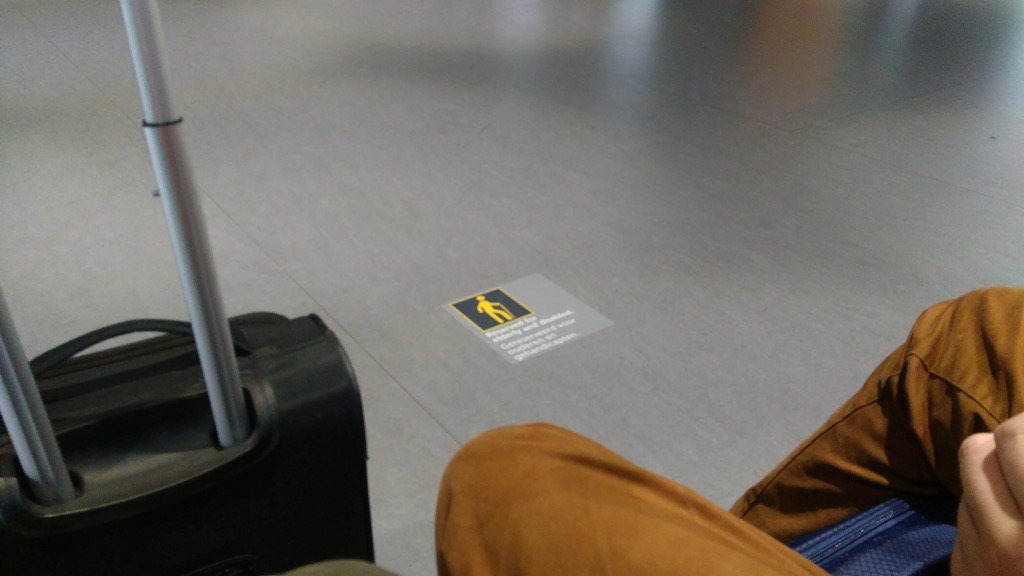
About 10 minutes later we were greeted by Pascal (pro tip: always ask assistants for their name; it instantly establishes a rapport) and I explained our situation. Pascal, it turns out, is an intern, halfway through his term at Schiphol, on the way to working in the air. He proved a useful aid, as he was able to be a sort of “advance man” out in front of us, opening the way for the special services (calmness, physical search, no crazy questions) that we needed. He walked us through check-in, and then from check-in to security, took us to the special services line there, explained to the security agent that we needed a physical search, walked through security himself (also getting a physical search), and pointed us on our way. We shook his hand, explained what a great help he’d been, with hopes that he will now go on to a more autism-flyer-friendly career.
The physical search itself was conducted by the kind Patrick (see earlier pro tip), and was done calmly and without delay. Oliver remained calm and happy throughout, even through, deep in our hearts, we were both nervous and a little anxious.
Once we left Pascal, we headed into the departure gates, spotted a “reboost in 5 minutes” massage chair, and Oliver eagerly volunteered. Best €2 we’ve spent today.
And then we made a podcast.
On to Frankfurt!
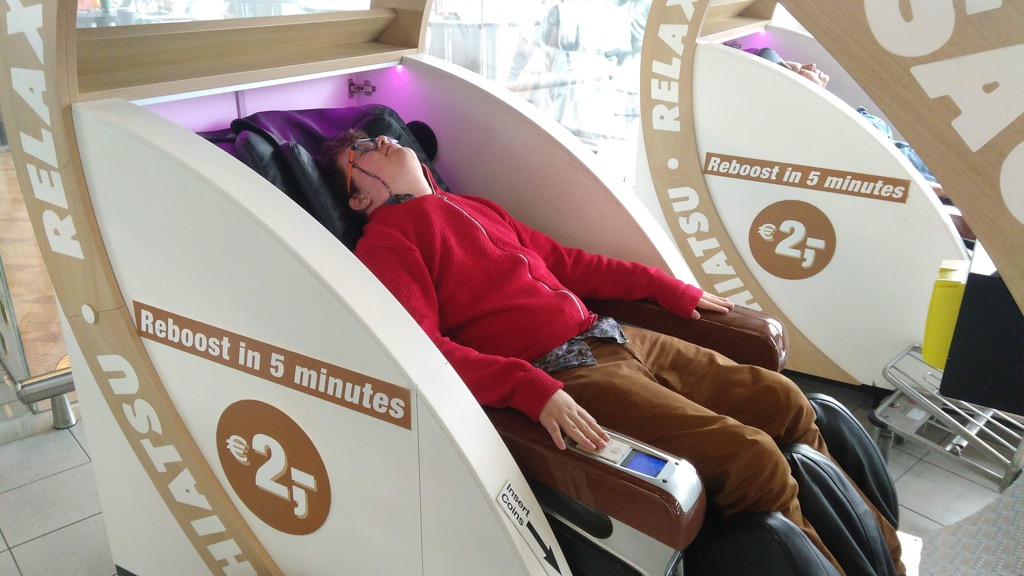
Young man relaxes with “revitalising shiatsu massage” at the airport after successful, calm passage through security. Best €2 we’ve spent today.
If there was a travel planning bug when I put this trip together, it was only leaving 48 hours for Amsterdam. But we had a hard start for public school on Thursday on one end, and TonElmineCon on the other, so there was, alas, no way to squeeze in more time. So we got to sample a quick swath of Amsterdam today in hopes that we one day use what we learned as the basis for a return trip.
We started the day with the bountiful breakfast at ZOKU (therein following Pete’s Law, “always book a hotel with a good breakfast buffet”), and then lazed around on the roof, reading and sketching for another hour (therein following Pete’s Law, newly-learned, “travel is not a race”).
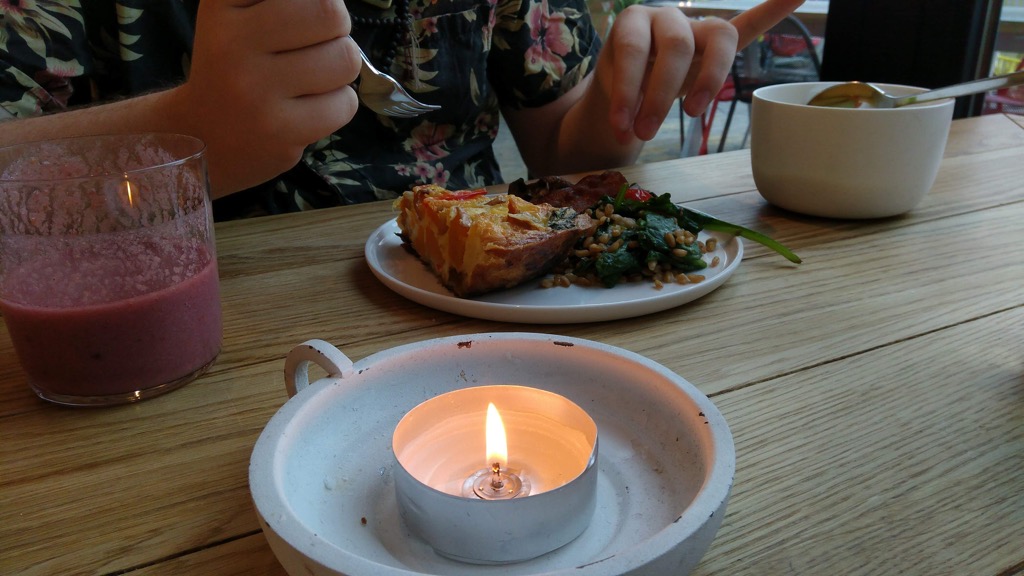
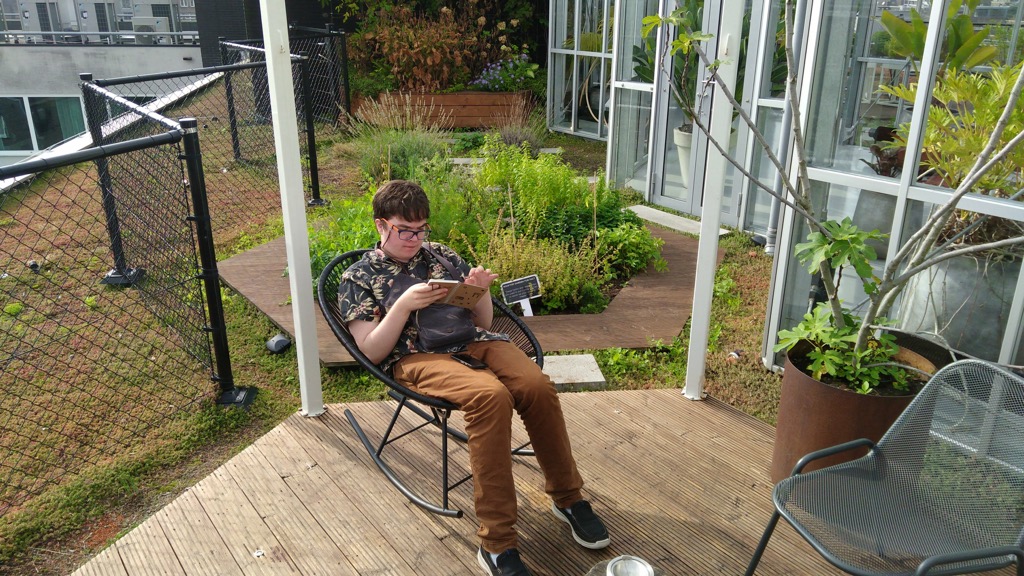
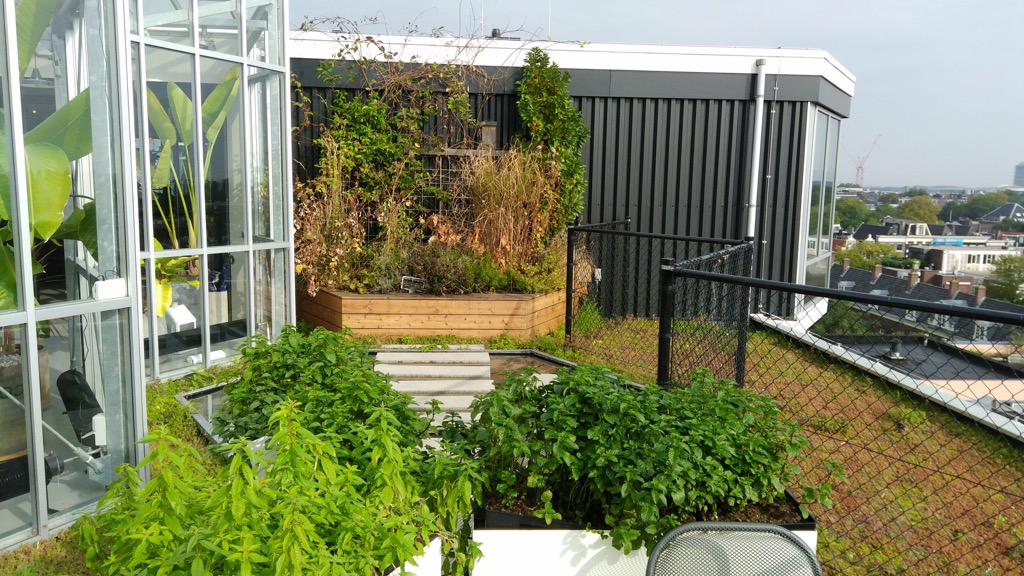
With a spring in our step from the hearty, relaxing start, we headed out on the town just after 11:30 a.m.
Given the success of our Malmö cargo bicycle beta test, we decided that our first stop would be to try renting a Dutch take on the people-carrying bicycle, the Bakfiets bike.
We walked up the street to MacBike Rental at Waterlooplein and found a straight-talking, helpful clerk there who considered the possibility and advised that I should try riding the bike without Oliver first, lest I be unable to, and he fall out. I left Oliver as a deposit, and headed off for a loop around the block.
The bike was unusual to ride, not surprising given how long it is, and how the front wheel is steered indirectly. But I managed to get the hang of it, and returned unscathed (“most people, if they’re gonna fall off, do so in the first 20 seconds,” I was told). Next it was time for Oliver to join in: I held the bike steady while he climbed into the wooden box and sat down, and off I pedaled.
With 150 pounds of teenager in the box the bike was even more unusual to handle, and after half a block I realized that even if I could get a rhythm down, I wouldn’t feel comfortable merging into the chaotic flow of Amsterdam cycle traffic, so, with heartfelt hanks, we bid our host goodbye and continued on without cycle.
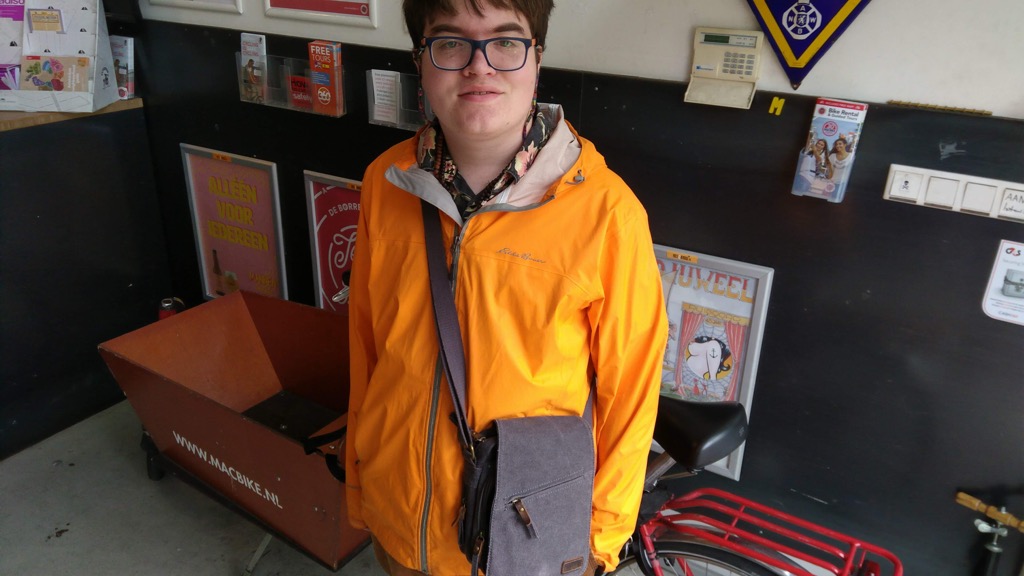
We walked west, through Rembrandtplein, and when we passed a Maoz Vegan restaurant on a corner Oliver, mindful of our need to eat and hydrate, insisted we stop for lunch, ever-mindful of my vegetarian tendencies. We enjoyed a couple of falafel sandwiches sitting at a counter overlooking both a tattoo & piercing shop and a multi-floor live sex show complex; Oliver was unphased.
Our next step was, I think, my favourite shop of our entire trip: the Boekie Woekie bookshop on
Although we’d only been out for a couple of hours at this point, a break was in order, so we rounded the corner and walked up the canal to Koffiehuis ‘De Hoek’ where Oliver devoured a piece of Dutch apple pie and I discovered “fresh ginger tea,” which, as near as I can tell, is made simply by pouring boiling water over slices of fresh ginger (it was great).
Eager to see something of the Amsterdam waterfront, and armed with a recommendation from Harold, we walked to the central train station, through a tunnel under the tracks, and directly onto the ferry that runs to the area around the A’DAM building across the water (the ferry carries bicycles, scooters, and pedestrians, and it’s free). The neighbourhood across proved to be an interesting one to wander around: we largely ignored A’DAM (the perilous-looking swing suspending from the penthouse was forbidding-looking), but we toured an interesting shipping-container-housed exhibit on waste management in New York, Jakarta, Lagos, São Paulo and Amsterdam, got a coffee at Coffee Virus, hidden inside the A LAB, and then wandered around the A LAB itself (which appears, from our brief tour, to be kind of like Betahaus on steroids).
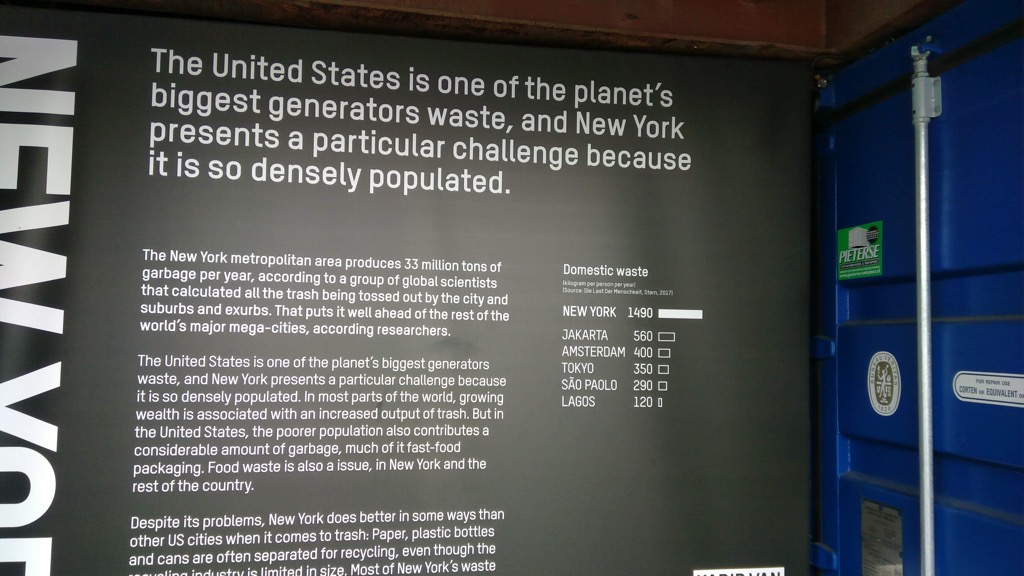
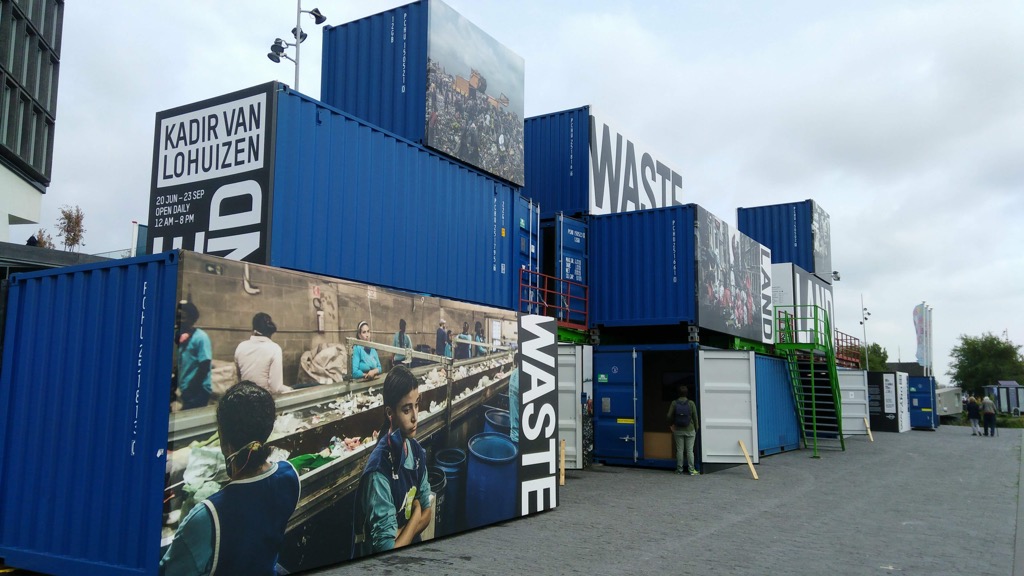
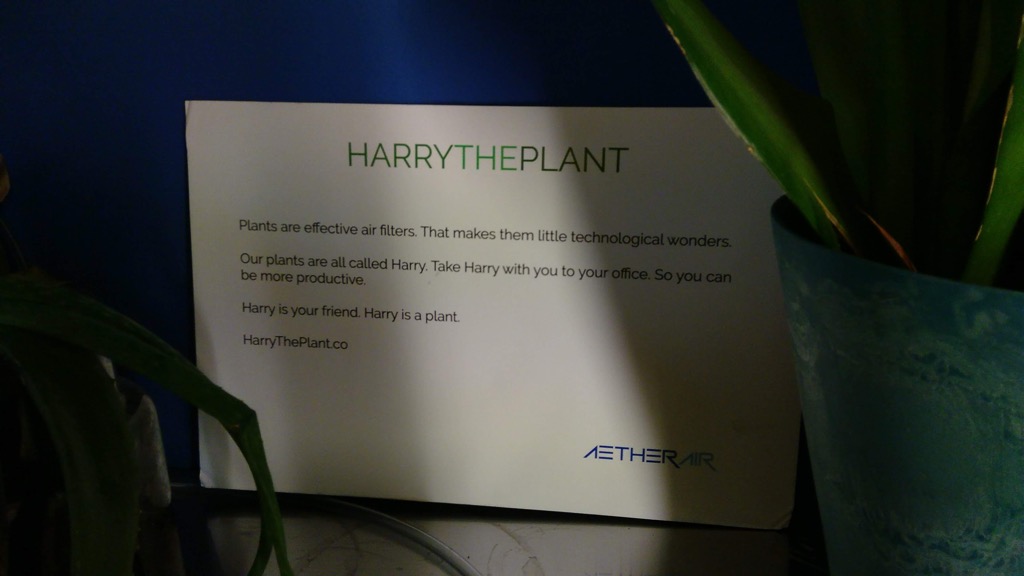
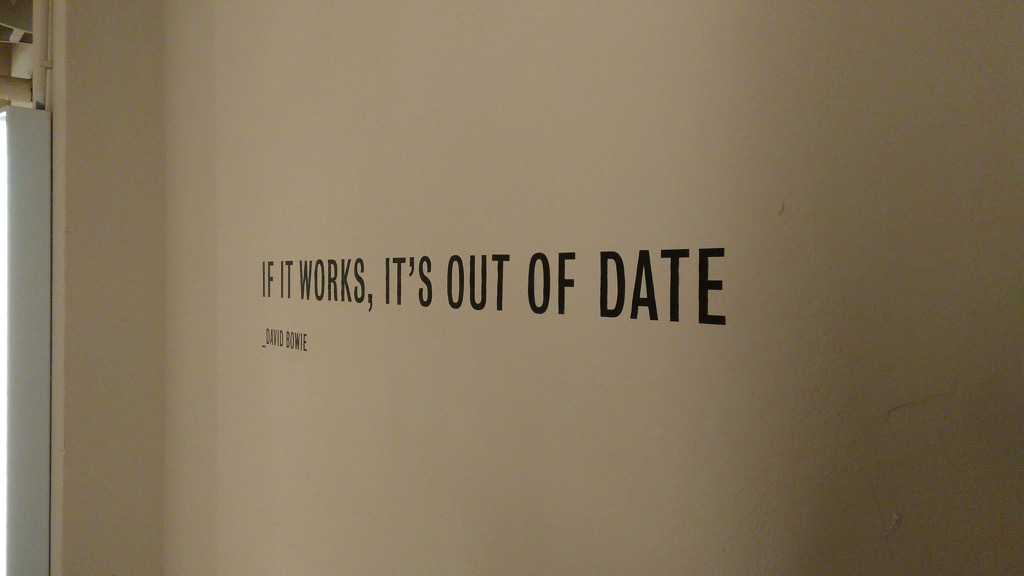
There was really only one place that I had to visit in Amsterdam, and that was Mediamatic.
I first learned of Mediamatic when the content management system cum wiki that powers its website was used to manage the website of one of the reboot conferences. I created a page for myself on the Mediamatic website back in 2007 and it’s been there ever since. Also since then I’ve been subscribing to the Mediamatic email newsletter and paying attention to its various projects. So I’ve developed an affinity for the place, even though I’ve never visited. Until today.
Mediamatic describes itself like this:
Mediamatic is a cultural institution dedicated to new developments in the arts since 1983. We organize lectures, workshops and art projects, focusing on nature, biotechnology and art+science in a strong international network.
As far as the general day-to-day public is concerned, the easiest way to experience Mediamatic is through Mediamatic ETEN, its restaurant, and that’s where we pointed ourselves for supper tonight.
That pointing turned out to be something of a vertical challenge, as dutifully following Google Maps’ directions put us in full view of Mediamatic, but on a bridge two stories above, initially unable to derive the geographical path between us and it. Fortunately an elevator manifested itself at the end of the tram platform, and soon we were walking onto the grounds and in the door of the restaurant.
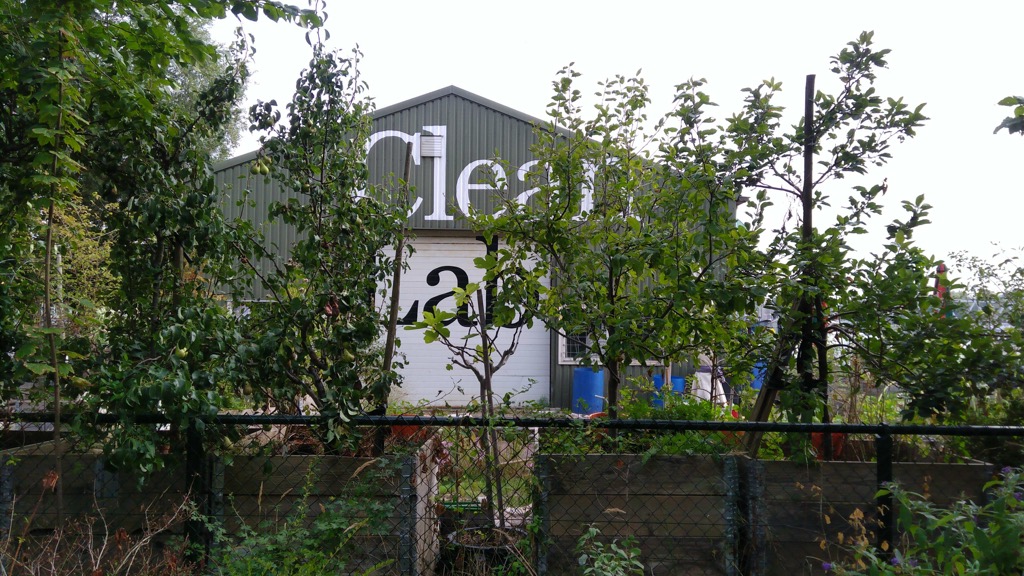
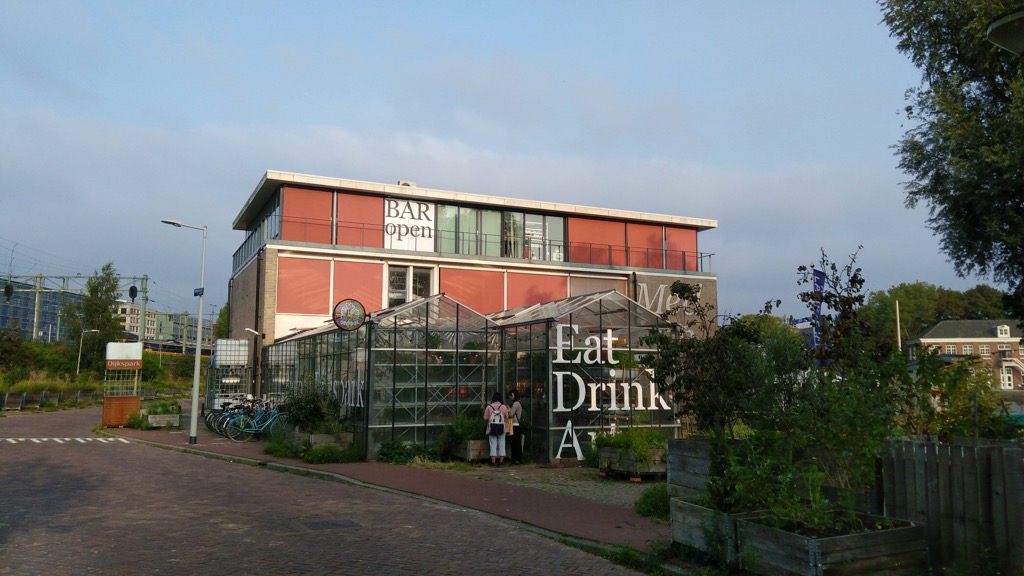
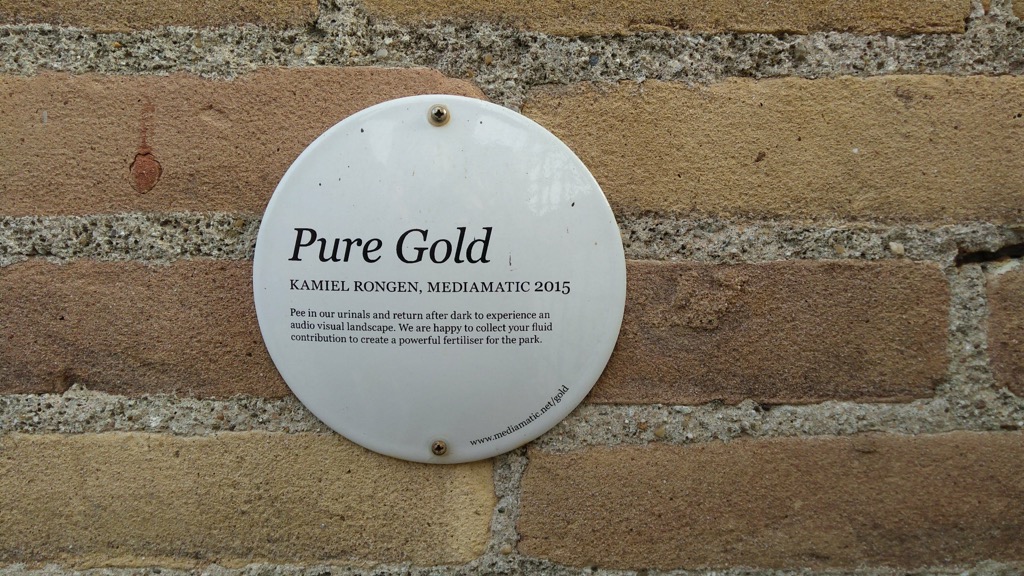
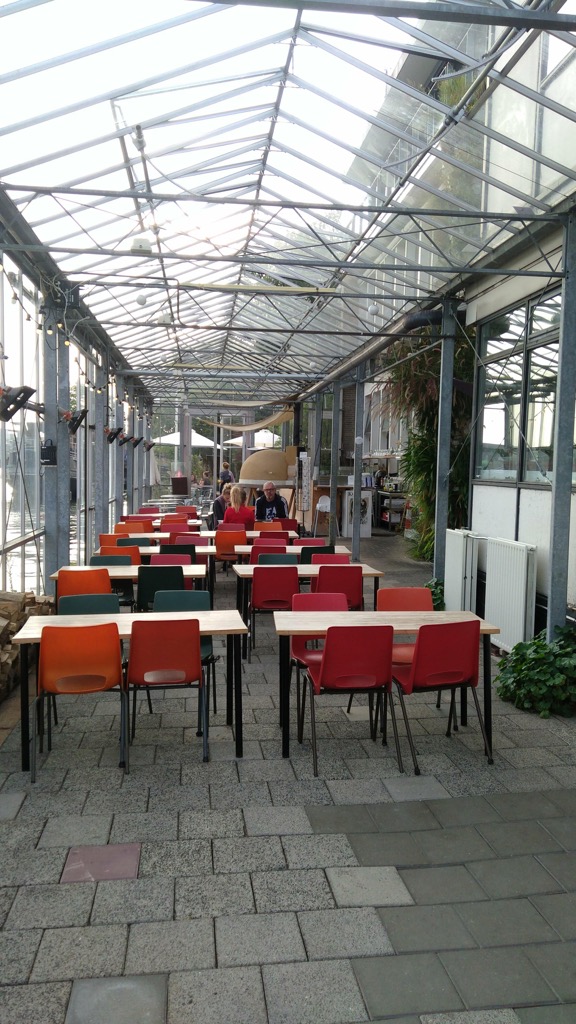
Mediamatic ETEN is a vegan restaurant perched on the water, overlooking the Nemo science museum. They were serving pizza this evening, and we ordered up the Pizza Nero, an apple-pear juice, and a Swingers beer (“Reminiscent of sun, the beach and the fresh saltiness of the North Sea, Swingers is the perfect partner on the dance floor we call life.”)
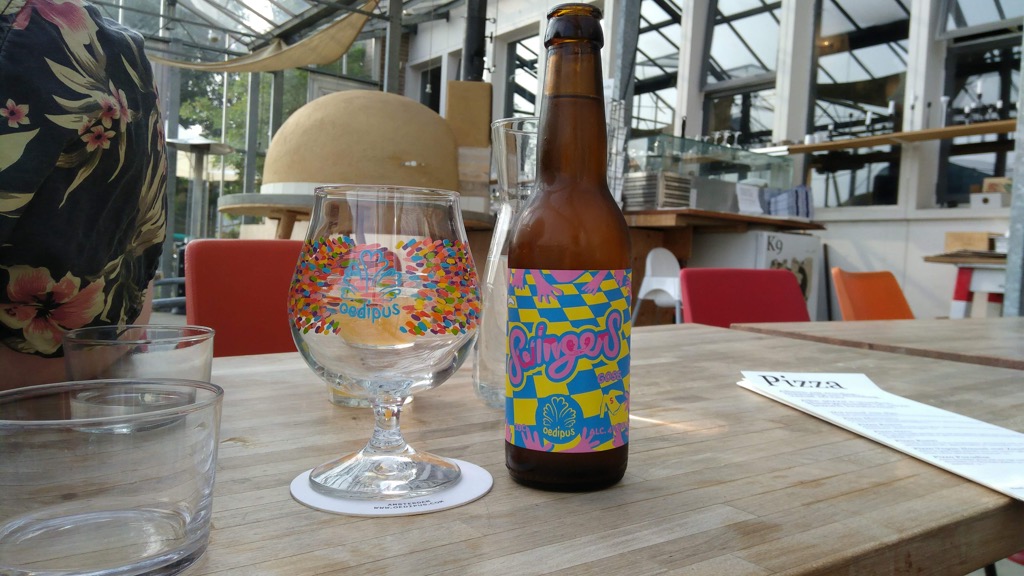
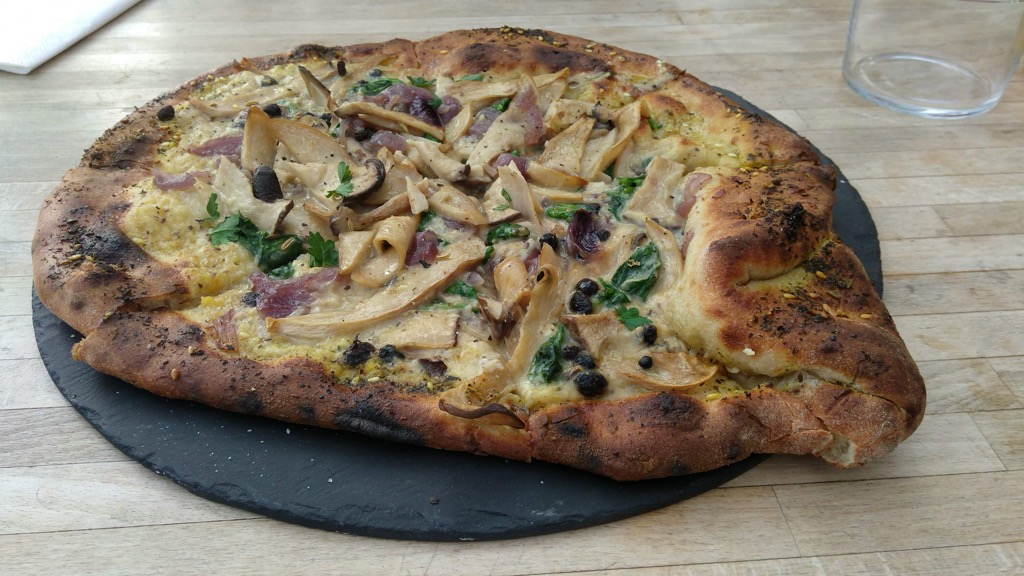
The pizza, covered in mushrooms, onions, beans and greens, was delicious. And the beer was, indeed, reminiscent of the North Sea.
From Mediamatic, we took the hidden elevator back up to the tram platform, caught the № 26 to central station, and, from there, took the Metro № 53 back to ZOKU, stopping to take a photo of at least one of the city’s canals before leaving.
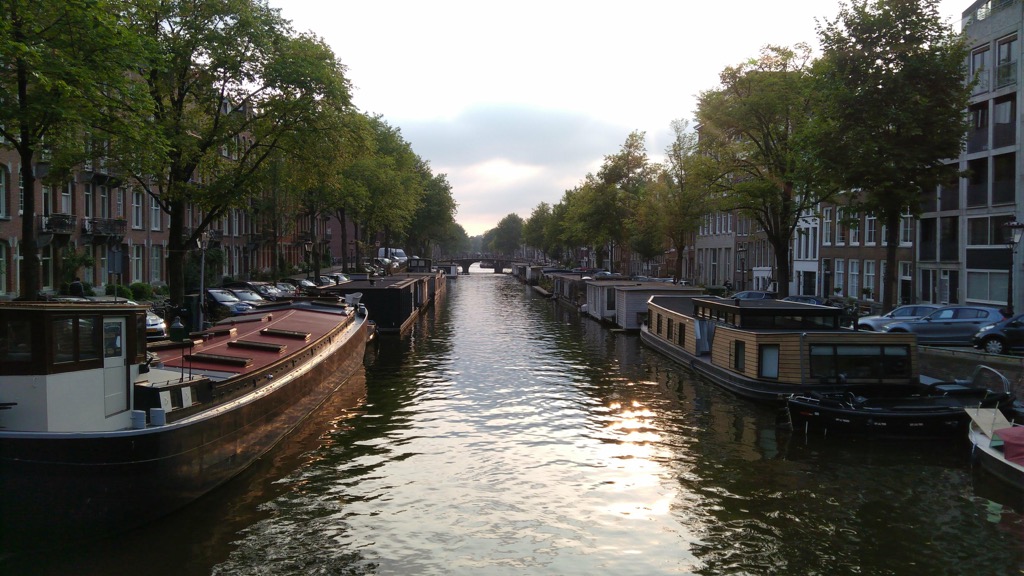
As I type we are in the sixth floor “living room” at ZOKU. I’ve just polished off another fresh ginger tea; Oliver a chai latte; and we shared a dish of mixed nuts (I could get used to having drinks and snacks easily-ordered 24/7).
Sitting here typing away I’ve just noticed that the cork map of the world that’s mounted on the wall behind Oliver is missing Prince Edward Island; if we had more time, I’d use the 3D printer at the bar to rectify this. But we don’t. So we’ll have to come back another time.
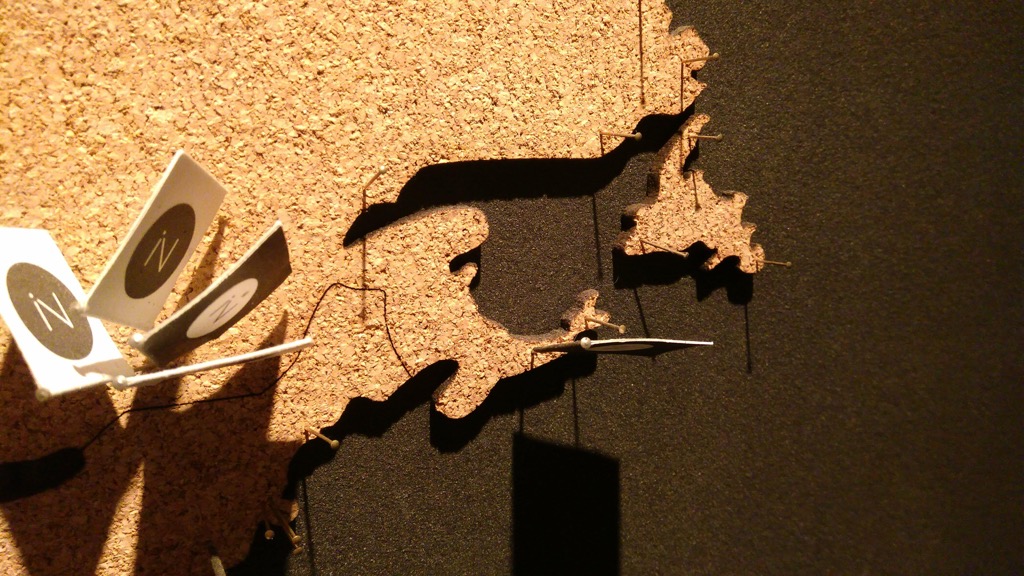
We take the long Amsterdam-Frankfurt-Halifax journey tomorrow, arriving in the early evening; after an overnight, we’re back on the Island on Wednesday afternoon. And Oliver starts grade 12 on Thursday morning.
I had a chat with Pedro yesterday about the utility of opening yourself up to “randomness” when traveling (or, for that matter, when moving through life). Randomness, put another way, is simply not having a plan, and allowing what might happen to happen. This does not mean that it doesn’t take effort: it’s often hard not to have a plan, not to fall into established patterns, to do what is expected of someone like you in such and such a situation.
Practicing this has resulted in some of the brilliant moments of travel in our family’s life. It’s how Oliver and I ended up by ourselves at the zoo in eastern Slovakia, how I found myself falling into a hole on a construction site in Munich, and how the path led us to be the only guests in a small hotel south of Barcelona. In each case we’d left the Lonely Planet at home, and headed off to see where the road might lead. It almost always leads somewhere interesting.
Today that interesting place was the storied Paradiso club here in Amsterdam. We hadn’t planned to go there; indeed we had no plans for this evening save perhaps to find a place for supper and to take a walk. But an accidental web search led me to learn that tonight at Paradiso was Sugar Mountain presents Tyler Childers, Parker Millsap, e.a. and that was interesting enough bill to catch my eyes; tickets were only €15 and that sealed the deal.
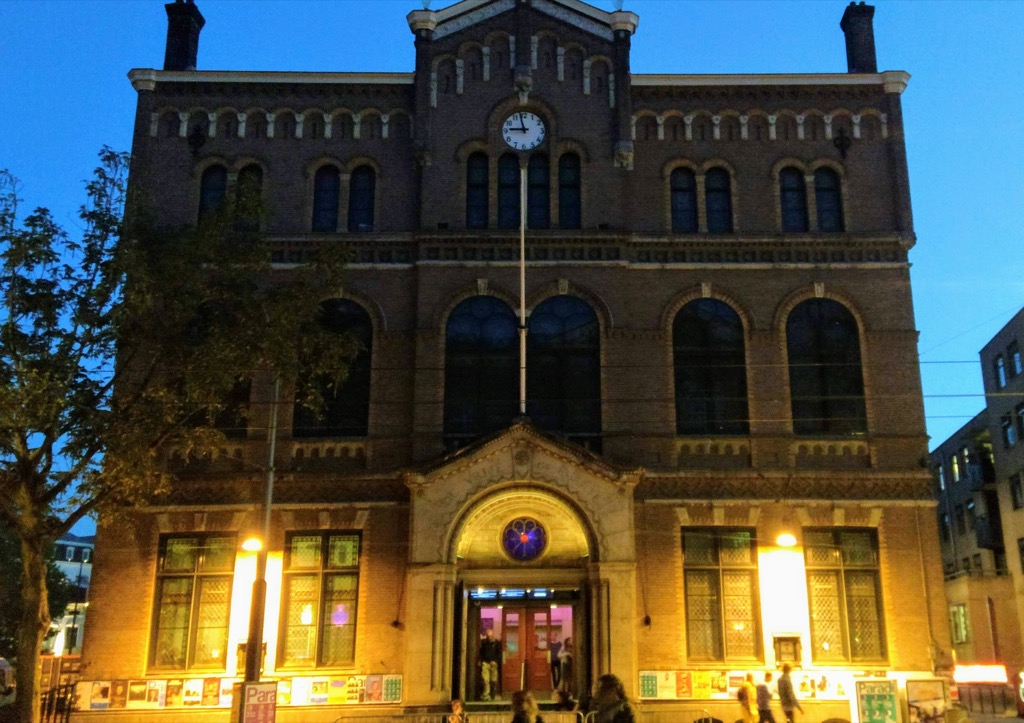
Paradiso is only a 20 minute walk, a straight shot parallel a series of canals, from our base here at ZOKU; between my noticing the show at 4:30 p.m. and heading out the door at 5:30 p.m. I managed to buy tickets, figure out how to use the printer in the lounge, print the tickets, and get ourselves packaged up for the evening.
As we walked into the main theatre and found a place to perch ourselves the lights came down and Parker Millsap and his band took the stage. From the first chord I realized that I was going to need ear protection to withstand the show with my 52 year old ears; fortunately the club helpfully has free foam ear plugs on offer at the door.
Millsap and his band were hard-driving country-influenced rock. They were a tight ensemble, and the played a solid set; it wasn’t particularly to my taste, but it was a good way to start the evening.
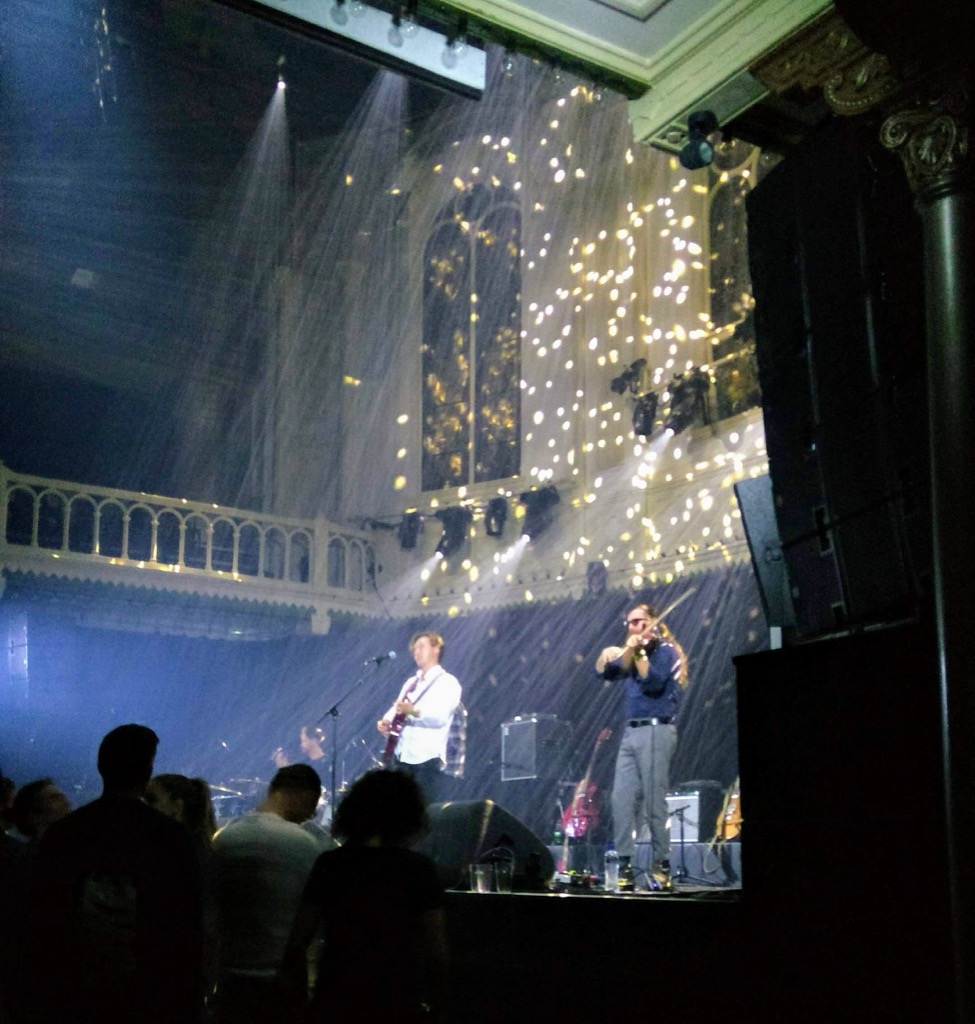
Millsap’s set was only 40 minutes long; as soon as it was over we moved to the smaller second-floor hall for Ruby Boots (“e.a.” in Dutch means “and others,” and Ruby Boots, fronted by Australian Bex Chilcott, was one of the others). The band is usually a guitar-heavy Americana band; this evening it was just Chilcott on guitar and a single band mate accompanying. They did their best to approximate the volume of the full band, and, with by Chilcott’s powerful voice and skillful songwriting, it was a delightful hour-long session.
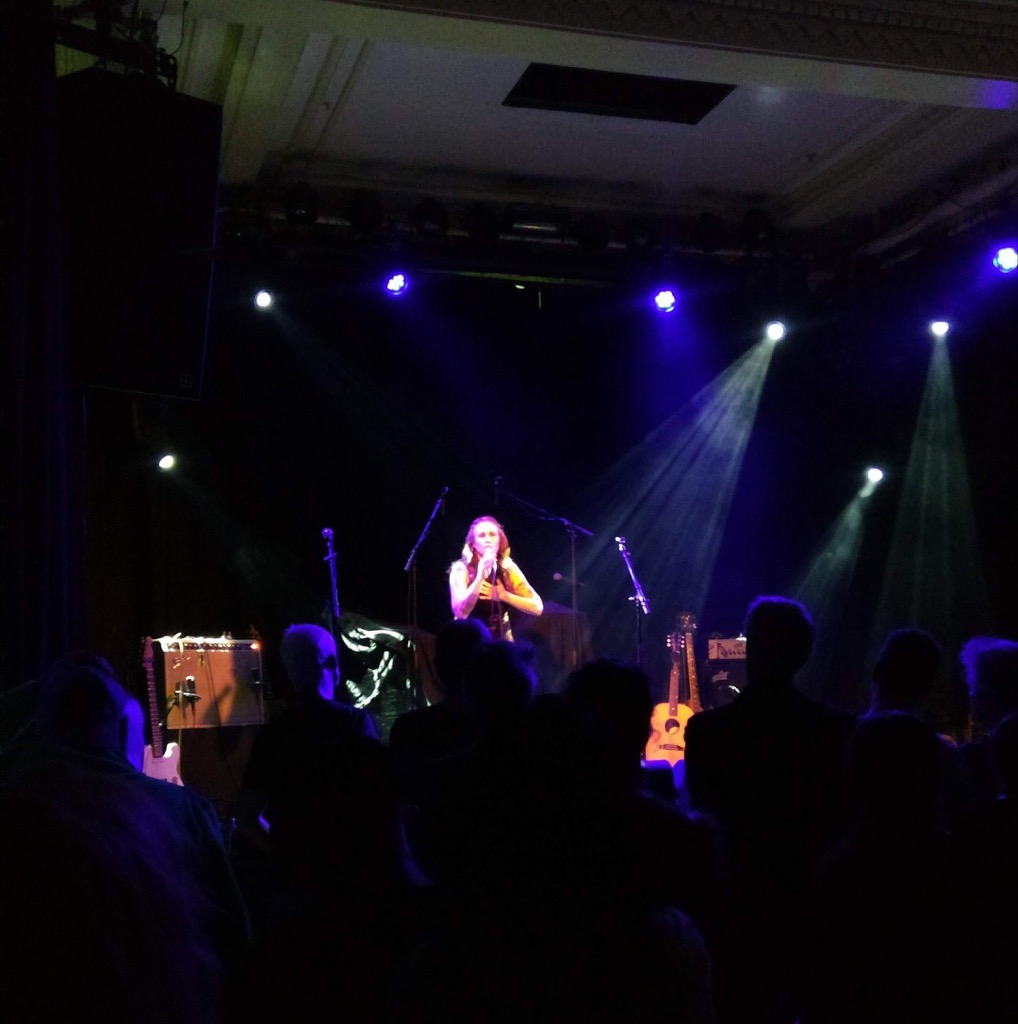
The main event was Tyler Childers, back in the main hall.
While the other acts were solid, Childers and his band were crackerjack, and transported the night from a novelty to a happening. Their Kentucky-fueled country rock was well-crafted and energetic; it’s almost impossible to believe that Childers is only 27 years old, as his songs seem written by someone with considerably more life under their belt. We stayed for the entire 75 minute set, and enjoyed every song (it’s not every Kentucky country band that inserts a cover of Kiss Me by Sixpence None The Richer into their act).
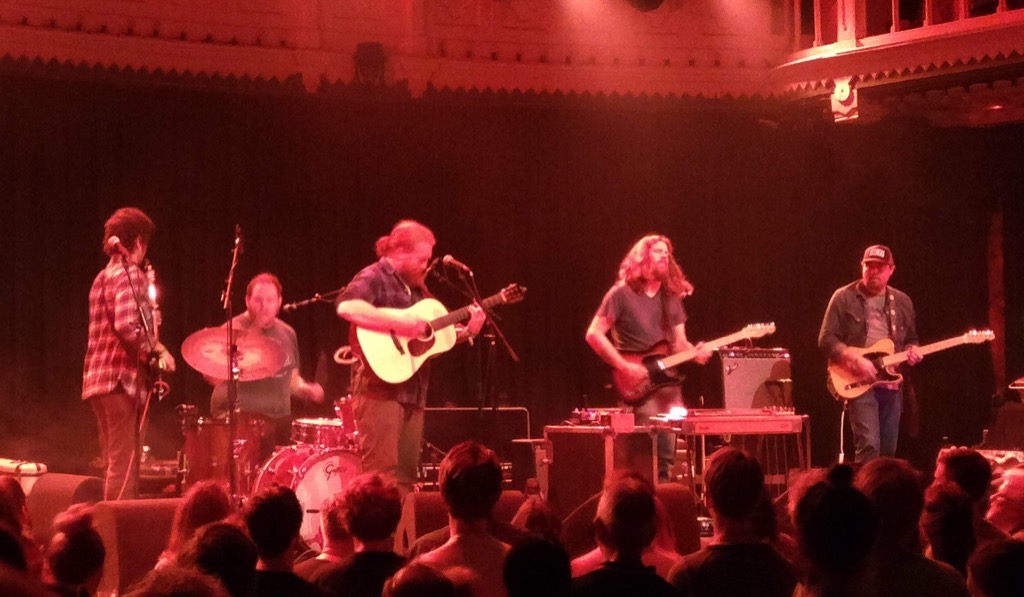
Our lack of a plan served us well tonight; we’ve one more day to try the same approach again before we fly home to Canada on Tuesday.
(As should be obvious from the photos above, my aging phone’s camera is dreadful at low-light action shots; I wanted to include something to document the night, though, so I included the photos despite their fuzziness).
It is a sunny Sunday in Amersfoort, and I am sitting on the tiny third floor balcony of our rented flat, looking out over the back yards of our erstwhile neighbours. Across the way and several back yards up a quartet us hanging their laundry and inspecting their garden; a neighbour two doors down shouts greetings at them, sticking his head out his third floor skylight so that they can hear him.
The clock is ticking down to our check out time at noon, but I am choosing to eke out every minute of peace before we enter into the maelstrom of Amsterdam and then home.
Oliver and I spent two very happy days with friends here in Amersfoort, a gathering catalyzed by our friend’s Elmine and Ton on the occasion of Elmine’s birthday. It is the second time we’ve joined the “birthday unconference” caravan, and even though Tom and Elmine have moved across the country in the four years since we were last here, it feels like coming home.
It seems folly to try to document what happened over these two days (although Frank has done a good job), so I will instead focus on three things that stand out.
First was Oliver’s talk.
The “un” in “unconference” means “there’s no formal program, and there’s no audience: we and us form the program together.” And so Oliver stood up on the stage—a tiny step-stool—and pitched the idea of presenting “Google Home and Amazon Echo and Ring Doorbell and Police Surveillance Cameras.” He received an enthusiastic reception, and a time was set on the schedule for him.
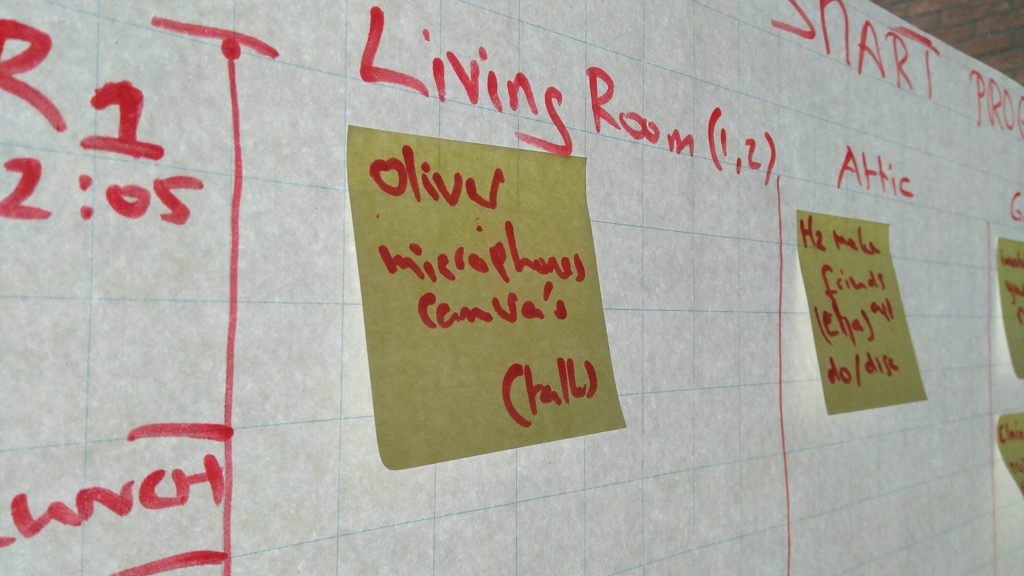
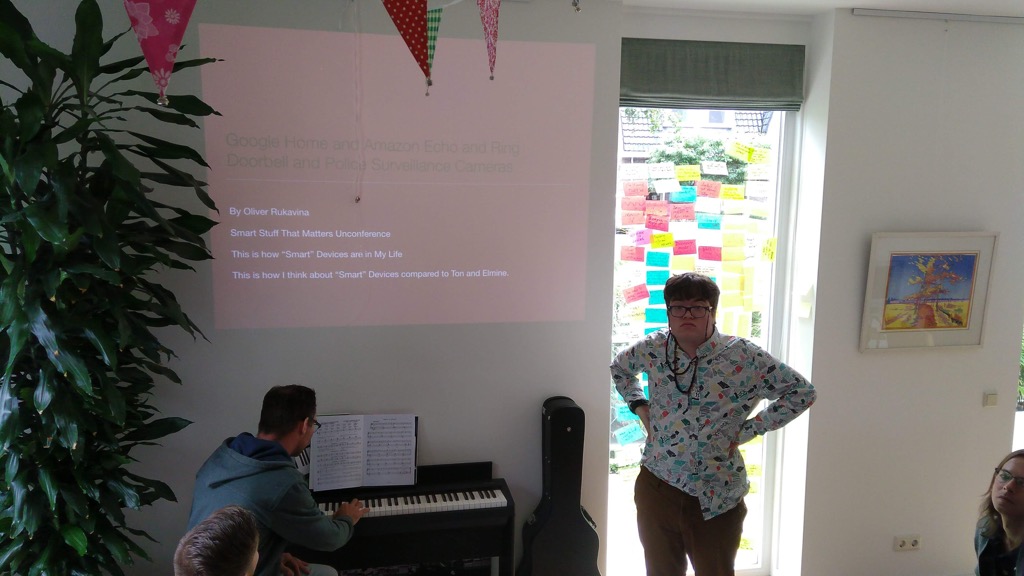
At the appointed hour, with me advancing the slides from the balcony, he presented his slide deck (see slides here) with confidence. The last slide in his deck was “do you have any questions for us?” and this then precipitated 45 minutes of rousing discussion on privacy, access, streaming music, and home control. I was very proud of him: the initiative was entirely of his own doing, he crafted his slides on his own, and got himself on the schedule through his own will. He is becoming a force in the world, and that is awe-inspiring to see.
The second highlight is an event that preceded Oliver’s talk, the “icebreaker” part of the day that led things off. I have always dreaded the “everybody introduce yourself” part of meetings, especially meetings of diverse people whose lives inevitably seem much more interesting than my own; this, thankfully, was dispensed with, and instead we were prompted to gather with people we didn’t yet know and to talk about our best and worst moves in life.
What proceeded from this simple prompt was a rich discussion of what it’s like to live as an expat, how difficult it is to make friends as an adult, and the power of neighbourhood connections. Oliver and I were in a group with Heinz and Elja and Martyn, and we talked for almost an hour. I have no idea what any of the others in our group do for a living, but I know that Martyn mowed his lawn this week in preparation for a neighbourhood party, that Heinz lives in an apartment block where it’s hard to get to know his neighbours, and that Elja has lived in Hungary, the USA and Turkey, and has the most popular Dutch blog post on making friends.
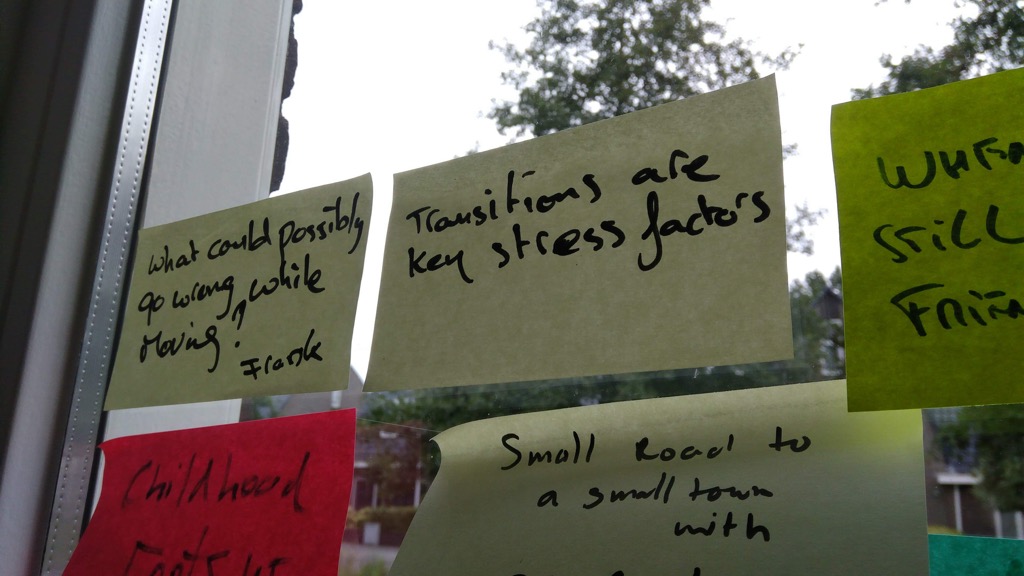
Finally, and most deeply, I appreciated the chance to reconnect with old friends, and to make new ones.
I proposed a session on accessible housing, and through that session got reintroduced to Xavier and Simone, who I’d met four years ago.
Oliver and I rode the train from Berlin to Amersfoort with our friend Martina and this both afforded us a chance to talk more intimately than long distances have allowed, and also provided me with support when the trip took a challenging turn, and I needed someone to bear witness and to seize control over shifting logistics.
Our friend Pedro flew from Indonesia to be here and we instantly reconnected and both picked up the threads of conversations we’d left off four years ago, and shared stories of our more recent sorrows and adventures.
I sat with Johnnie, who I hadn’t seen since Reboot many years ago, on the couch in the living room for a few short minutes before lunch and our chat quickly turned to the joys of participating in projects or discussions or meetings where you have only a casual interest, and thus no hill to guard.
It was a pleasure to meet Frank, who’s joined Ton and me in an ad hoc effort to understand the Indieweb, in person, and to participate in his session on redecentralizing the web; our digital discussion will be so much more powerful now that we’ve met in the flesh.
I got to spend time–not enough–with Lilia and with Robert, also “stuff that matters” veterans from the last round, and to learn of their latest adventure, starting a new company.
Elmine’s brothers, Harmen and Siert, were both there and I got to chat with both of them, and to witness Harmen’s Olympic-level avuncularity with his niece Y., and to hear about Siert’s adventures in 3D fabrication since I heard him talk about RepRap machines at reboot a decade ago.
Ton introduced Oliver and me to Matthijs, the son of a collaborator; he is a dynamic young man considering a move to Canada, and we had a good chat about education, employment, escaping the orbit of your home culture, and what may lay ahead for him. He also gave me an excellent survey of the current state of Android phones, pointing me at models I’d never heard of.
There were almost 40 of us in total, and even more at the Saturday barbecue that formed part two of the weekend, and the chance to spend time with such a diverse and interesting bunch, in the almost-as-if-purpose-built surroundings of Ton and Elmine’s new house, was a great privilege; to have Oliver join me as a partner in the endeavour made it all the better.
The day wasn’t entirely without dipping into the hard “stuff” of “stuff that matters”: Oliver and I constructed a pneumatic tube-based messaging system that allowed notes to be sent to the garden, an activity that provided a way for us to truly to something together, but also to step away from the fray a little.
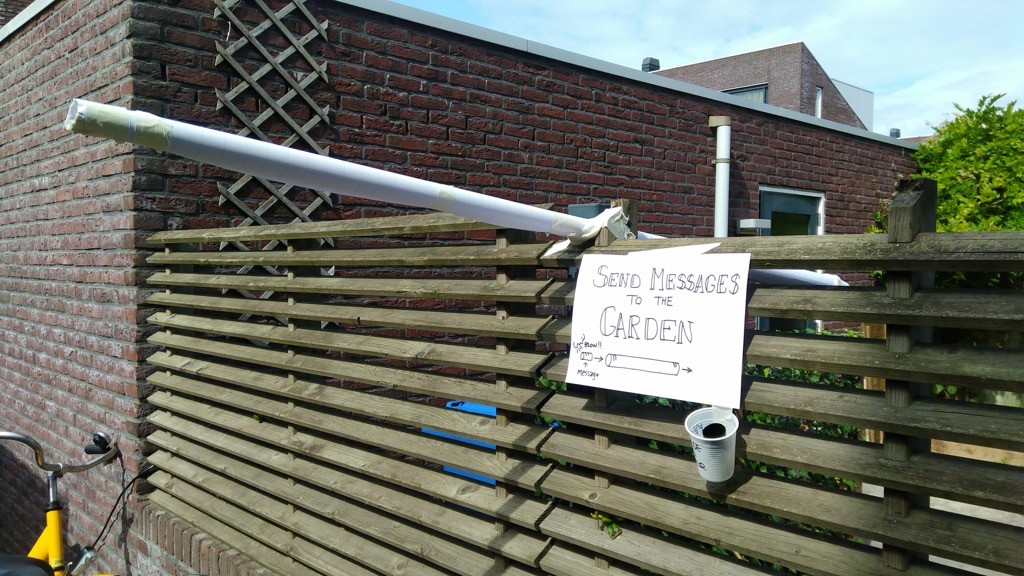
As the night wound down yesterday, and friends and family took leave, we found ourselves the last to depart, leaving Elmine and Ton and Martina and Pedro to recover from the whirlwind and get some sleep.
I took this photo, a little blurry alas, but heartfelt nonetheless, of Pedro and Elmine sitting on the couch; the photo is both a testament to a great friendship, but also a proxy for the feeling that washed over our time here. Ton and Elmine are courageous explorers of new social terrain; I’m so happy to be part of their merry band.
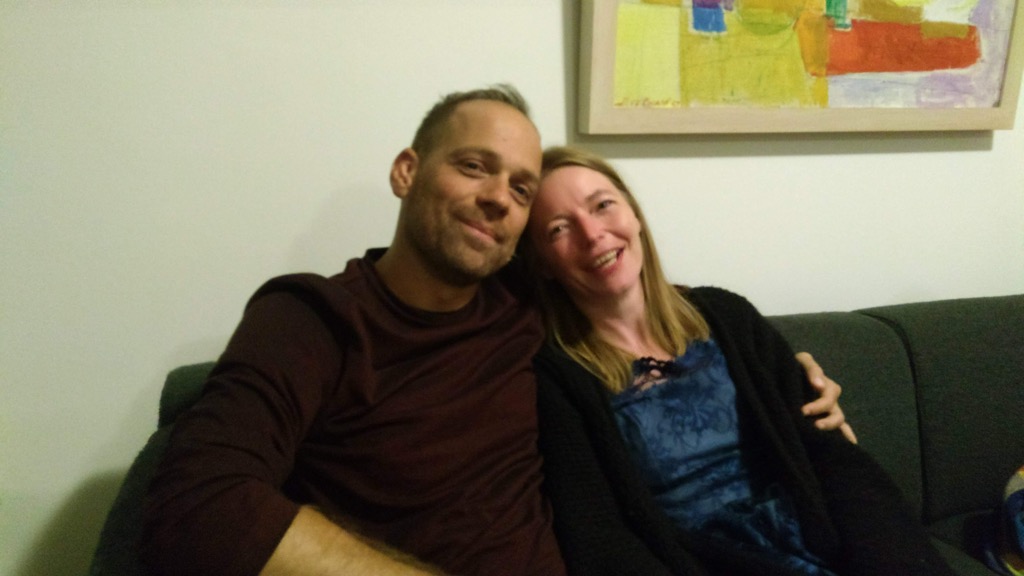
There is a small playground across from our flat in Amersfoort with this sign posted in front. I love the rules and how they’re communicated in words and stick figures.
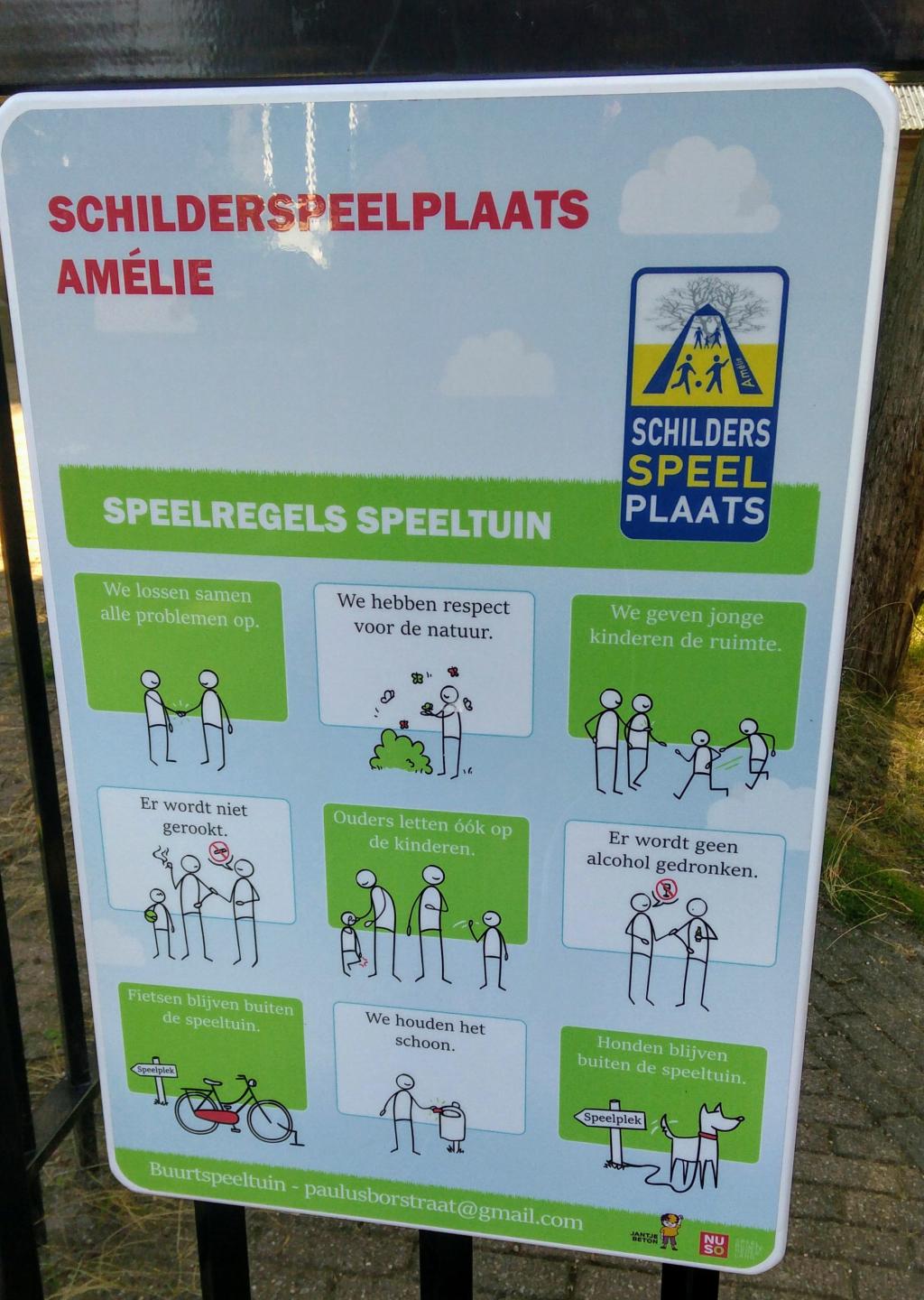
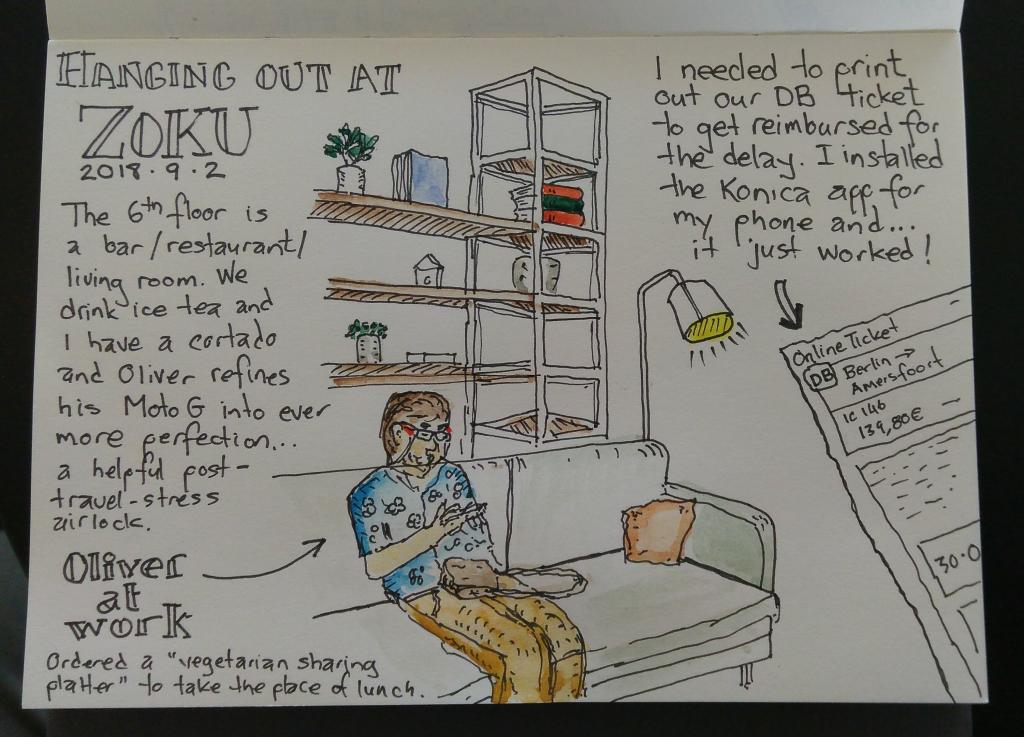
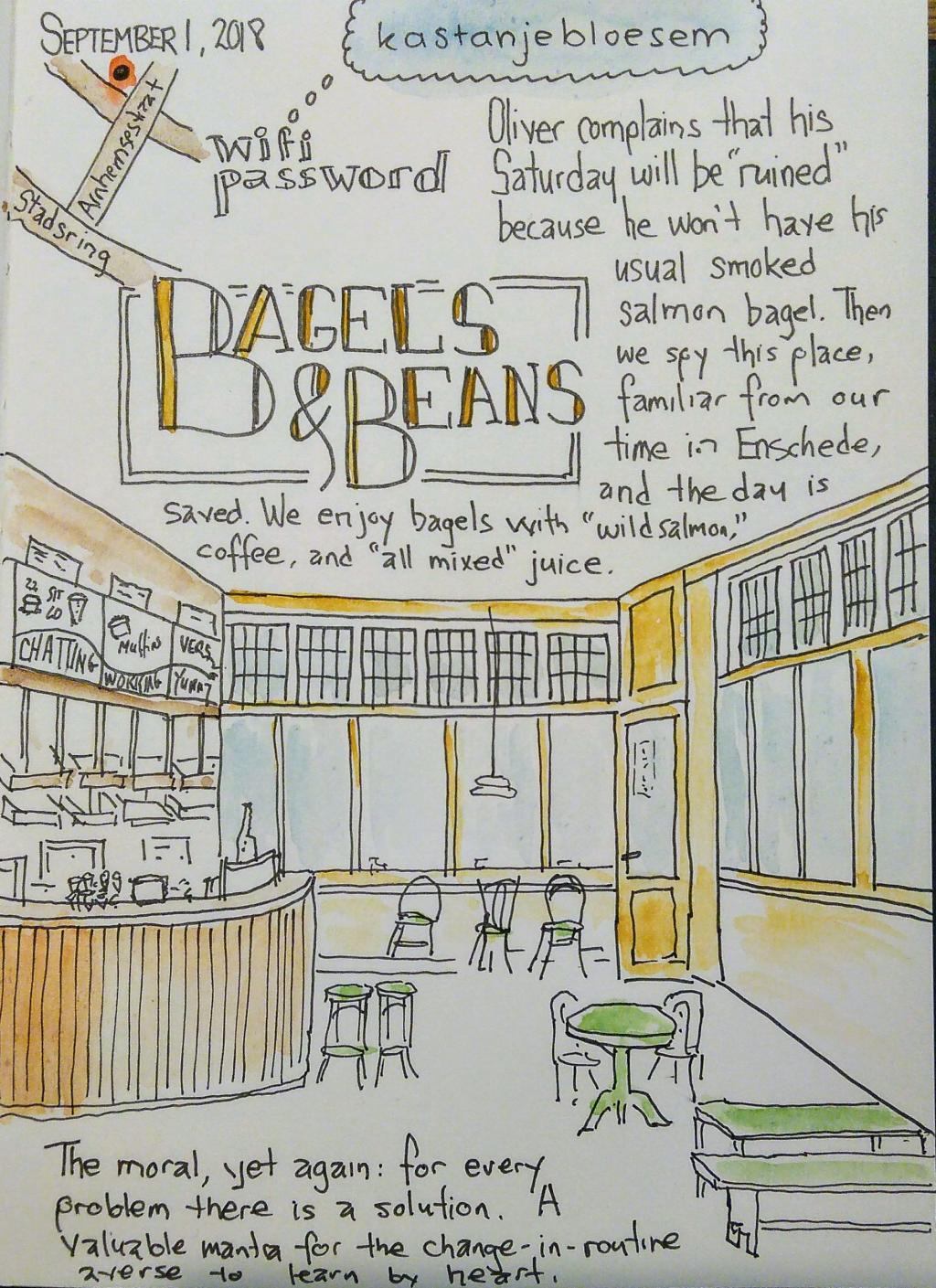
 I am
I am